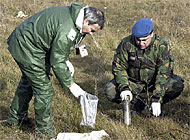The week in Switzerland

Two health-related issues dominated the news in Switzerland this week: fears about the effect of depleted uranium weapons on soldiers who served in the Balkans, and the revelation that tobacco companies had undermined Swiss anti-smoking efforts.
After initially playing down the possibility that Swiss troops could have fallen ill as a result of their deployment in Bosnia-Herzegovina or Kosovo, the army was forced to act on Sunday.
The revelation that one soldier had died of leukaemia in 1998 after spending time in Bosnia prompted the army to offer medical tests to the 900 troops concerned.
It also opened a hotline, which was flooded with calls in the first two days, for troops who brought back souvenirs of ammunition from their tours of duty.
Swiss farmers vented their anger at the planned reduction of prices paid to producers by Coop, one the country’s major retailers.
Hundreds protested outside three distribution centres near Zurich, Bern and St Gallen on Monday, followed by smaller demonstrations in French-speaking parts of the country throughout the week.
The protests followed one in December near Fribourg, although the farmers did not blockade distribution centres this time round. Coop had already agreed to meet the farmers’ representatives on January 27 to discuss the pricing.
The government’s decision on Wednesday to increase subsidies to farmers by two per cent was welcomed by farmers, but failed to stop the protests.
Big tobacco was the target of the World Health Organisation’s first ever study into the practices of cigarette makers in Switzerland. Phillip Morris and other tobacco industry heavyweights were accused of using underhand methods to block new measures against smoking.
The report pointed out in particular the collusion with the hospitality industry. Phillip Morris said the study represents bygone practices and does not reflect current cooperation with tobacco prevention authorities.
The Federal Institutes of Technology have focused their attention on one of the ills affecting Swiss research, the brain drain. The Zurich and Lausanne based schools are setting up a tenure track system to guarantee quality research.
The universities are to create new assistant professor positions, allowing scientists as young as 30 to undertake their own projects, with a view to obtaining full tenure six years later.
The World Economic Forum’s annual Davos meeting is fast approaching, and a number of non-governmental organisations are planning their own event in the Graubünden resort. This alternative conference will call for a fair global economic policy.
The organisers of this event said on Thursday guest speakers would talk about the negative impact of globalisation. The NGOs also said they would not take part in a planned demonstration in Davos, as they feared it may lead to violence like last year.
On the ski slopes, Switzerland’s Michael von Grünigen failed to win the giant slalom World Cup outright in the Bernese Oberland. MvG – as he’s affectionately known in the Swiss press – came second to Austria’s Hermann “Herminator” Maier in Adelboden, although he maintained his first place in the rankings.
The Herminator’s victory under a blue sky and 13’000 spectators was his third in a row on the demanding Adelboden course.
swissinfo

In compliance with the JTI standards
More: SWI swissinfo.ch certified by the Journalism Trust Initiative
You can find an overview of ongoing debates with our journalists here . Please join us!
If you want to start a conversation about a topic raised in this article or want to report factual errors, email us at english@swissinfo.ch.